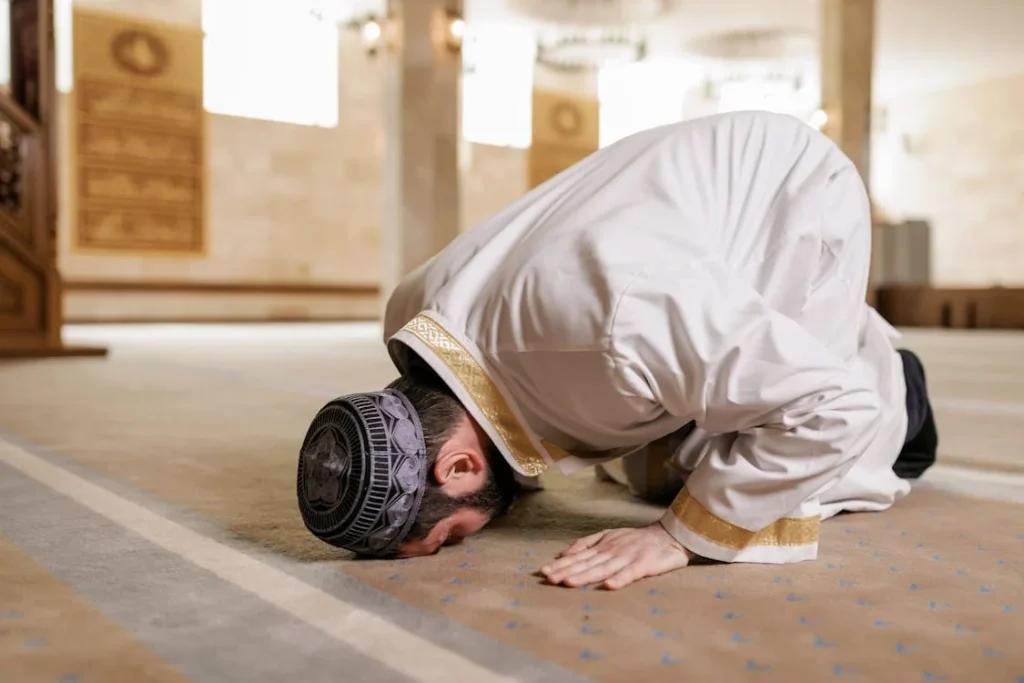Table of Contents
ToggleHow Many Times a Day Do Muslims Pray and Why It Matters
There’s something quietly profound about the rhythm of a Muslim’s day. It doesn’t start with noise or coffee or the rush to check notifications. It starts with stillness — with the first whisper of Fajr.
Five times a day. That’s how often Muslims pause the world to turn their hearts toward heaven. But this number isn’t just a count. It’s a call. A sacred weaving of time and soul, gently guiding the believer back to their origin.
Let’s not just count the prayers. Let’s feel them.
What Are the Five Daily Prayers in Islam?
Islam doesn’t ask for the whole day — it asks for presence. Five pauses. Five invitations. Each one a doorway to peace.
Fajr – The Prayer of Awakening
Before dawn breaks, before the birds begin their chorus, Fajr rises. It’s the prayer of beginnings. Of quiet hope. Of starting the day with the soul in front and the self behind.
Dhuhr – The Midday Stillness
As the sun reaches its peak, Dhuhr calls the believer to pause. To exhale. To remember that success isn’t in the rush, but in returning. Even for a few moments.
Asr – The Shadow Prayer
When the afternoon light begins to shift, Asr arrives. It’s a reminder that the day is passing, that life keeps moving. This prayer grounds you when the hours feel like sand slipping between fingers.
Maghrib – The Glow of Sunset
The sun sets, painting the sky in golds and purples. Maghrib is prayed as that final light fades — a closing of the chapter, a soft surrender to what was.
Isha – The Deep Night Conversation
Darkness wraps the earth. The world quiets. Isha isn’t just a prayer; it’s an intimate moment with Allah before sleep takes over. It’s the night saying, “You’re not alone.”

Why Five? Why Not More or Less?
Because hearts need rhythm. Because distractions are loud. Because we forget.
Prayer is the soul’s anchor in a spinning world. Five is mercy. Not burden. These prayers were not invented by scholars or decided by culture — they were gifted by Allah Himself on the night of Mi’raj — the miraculous journey of the Prophet Muhammad (peace be upon him). Not through an angel, but directly. That matters.
Five windows. Five sacred whispers. Five realignments.
What If a Muslim Misses a Prayer?
There’s no perfection in this path — only returning.
If a prayer is missed by accident, it’s made up as soon as possible. If missed deliberately, it’s a moment to pause and ask: Why did I choose the world over the One who made me? But guilt isn’t where it ends. Islam is soaked in mercy. Allah waits for us to come back, not to push us away.
Do Kids Have to Pray?
Not immediately.
Children are gently taught from around age seven. Not forced. Not scolded. Just guided. By ten, the habit is more encouraged — but always with compassion. Prayer, when introduced with love, blooms into joy — not duty.
And if someone comes to prayer later in life? They are still loved. Still welcome. Still held by the same Mercy that called them from the start.
Is It Hard to Pray Five Times?
At first? Maybe.
But ask anyone who’s built the habit, and they’ll say: “Now I can’t imagine life without it.”
It becomes less about obligation and more about oxygen. The world might think it’s inconvenient to stop and pray. But to the heart? It’s a relief. A return. A cleansing.
Five prayers are not interruptions. They’re healing.
The Hidden Power in Every Sujood
The most powerful part of prayer is when the forehead touches the ground — sujood. That low, humbling gesture carries the highest dignity.
You let go. You whisper secrets. You weep quietly. You ask without shame.
In sujood, the soul says what the tongue cannot. And Allah listens.
A Closing Thought
So how many times a day do Muslims pray?
Five.
But that’s just the surface.
What they’re really doing is rebuilding their heart — again and again — in five quiet, sacred waves. In the chaos of life, they choose to pause. To return. To remember who they are and who they belong to.
Try it once.
Close your eyes.
Whisper His name.
It might feel like the beginning of everything you’ve been looking for.
Deepen your understanding – new articles every Day!
FAQs
1. What happens if you don’t pray 5 times a day in Islam?
In Islam, missing the five daily prayers without a valid reason is considered a major sin. Regular neglect can spiritually distance a person from Allah, but sincere repentance and making up missed prayers are always encouraged.
2. How long do Muslims pray?
Each of the five daily prayers takes about 5 to 10 minutes. Altogether, Muslims spend 30 to 45 minutes a day in prayer, depending on how long they take in recitation and supplication.
3. What are the 5 times of prayer?
The five daily prayer times in Islam are:
-
Fajr (before sunrise)
-
Dhuhr (midday)
-
Asr (afternoon)
-
Maghrib (just after sunset)
-
Isha (night)
4. 5 prayers of Islam times
Here are the approximate times for the 5 daily Islamic prayers:
-
Fajr: Dawn
-
Dhuhr: Midday
-
Asr: Late afternoon
-
Maghrib: Sunset
-
Isha: Nightfall
Exact times vary by location and season.
5. How many Muslims pray 5 times a day?
Estimates vary, but surveys suggest around 60–80% of practicing Muslims pray all five daily prayers regularly, especially in devout communities and during Ramadan.
6. How many times a day do Muslims pray during Ramadan?
During Ramadan, Muslims still pray the five daily prayers, but many also pray Taraweeh at night, a special optional prayer, making it 6 or more prayers a day.
7. Why do Muslims pray 5 times a day?
Muslims pray five times a day because it was commanded by Allah in the Qur’an and practiced by Prophet Muhammad ﷺ. Prayer helps keep believers spiritually connected, grounded, and mindful of their purpose in life.
8. 5 daily prayers times
The five daily Islamic prayer times are:
-
Fajr (before sunrise)
-
Dhuhr (after midday)
-
Asr (late afternoon)
-
Maghrib (sunset)
-
Isha (night)
Timings change daily based on the sun’s position.
9. Do Muslims pray 5 or 7 times a day?
Muslims are obligated to pray 5 times a day. Other optional prayers like Taraweeh (in Ramadan) or Tahajjud (night prayer) can increase that number, but the required prayers are always five.
10. Do Turks pray 5 times a day?
Yes, practicing Turkish Muslims pray five times a day, just like Muslims worldwide. Turkey is a secular country, so observance may vary by individual, but the religious requirement remains the same.
11. How many prayers do Muslims have per day?
Muslims have five required daily prayers, known as Salah: Fajr, Dhuhr, Asr, Maghrib, and Isha.
12. Do Muslims pray on a Sunday?
Yes, Muslims pray every day, including Sunday. Unlike Christianity, where Sunday is the primary worship day, Islam requires prayer five times daily, regardless of the day of the week.







